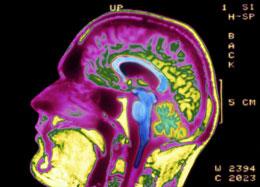
Moves are afoot to reduce the focus on disease-specific research in favour of more fundamental work.
Effort aims to bring together philanthropies with common interest in brain diseases.
Fifty years after US President John F. Kennedy pledged to send a man to the Moon, his nephew Patrick has brought together leading lights of neuroscience to tackle the "inner space" of the human brain.
At a meeting in Boston, Massachusetts, this week, the former Democratic congressman from Rhode Island helped to launch an initiative called 'One Mind for Research', which aims to boost support for neuroscience. Kennedy and his collaborators hope to convince funders to relax their focus on individual diseases in favour of supporting basic research on the fundamental workings of the brain.
The effort comes at a crucial juncture for the field. Even as technological advances in imaging techniques and stem-cell-derived disease models hold out the tantalizing possibility of new advances, neuroscientists, like other biomedical researchers, face the threat of cuts to federal research funding.
Meanwhile, researchers have watched as one pharmaceutical company after another has stopped research on diseases that affect the central nervous system. "They are exiting brain sciences as 'too difficult', just at a time when we're about to make it easier for them," said Steven Hyman, provost of Harvard University in Cambridge, Massachusetts, at the conference on Monday.
How One Mind for Research will change this landscape, however, remains unclear. Kennedy and his collaborators have enlisted the support of top academic and political players, including US Vice President Joe Biden, who delivered a keynote address yesterday. But some researchers expressed unease at the idea of blending their research goals with political rhetoric. And thus far the programme is long on lofty goals and short on specifics.
"The key question is, what's next?" says Thomas Insel, director of the National Institute of Mental Health in Bethesda, Maryland. "What's the agenda?"
Personal connections
One Mind for Research has its roots in a charity now called the International Mental Health Research Organization (IMHRO), which has been holding music festivals to fund research into neuropsychiatric diseases since 1995. The charity,founded by Shari and Garen Staglin after they learned that their son had schizophrenia, is part of a fragmented community of advocates for neuropsychiatric disease research. Insel estimates that there are about 50 disease-specific advocacy groups that lobby his institute for funding.
Over time, the Staglins realized that this fragmentary system was inefficient.
Disparate brain disorders sometimes share features, such as inflammation, meaning that a disease-specific focus could lead to duplication of effort. Nevertheless, uniting the charities under one umbrella is difficult, says Shari Staglin, because each organization wants to maintain its own stable of prized donors, and those donors — many motivated by personal tragedies — often want their funds to go to understanding the specific disease that has affected their lives.
But those barriers began to fall when the Staglins joined forces with Kennedy and enlisted the support of celebrities including actress Glenn Close and actor Martin Sheen. Kennedy, who has himself struggled with depression and substance abuse, has long had an interest in mental health and has worked to boost the coverage of mental-health therapies by medical insurance companies.
On message
At the meeting on Tuesday, Garen Staglin outlined a few of the programme's early ambitions to develop research tools, including a registry of patient records and tissue samples. Staglin says he hopes to build a repository of up to one million samples and, eventually, full genome sequences to accompany each.
Another goal is to launch an aggressive fund-raising campaign. The meeting emphasized issues that resonate with the public, such as the plight of US soldiers in Iraq and Afghanistan who have faced high rates of post-traumatic stress disorder and traumatic brain injuries. "These 'wounded warriors' provide an opportunity to highlight the struggle faced by everyone who suffers from mental illness," says Kennedy. "The American people are paying attention to the fact that these soldiers are falling through the cracks."
In July, the initiative will hold a meeting of business leaders in the health-care industry. The hope, says Husseini Manji, global head of neuroscience research and development at Johnson & Johnson Pharmaceuticals, headquartered in New Brunswick, New Jersey, is to get the attendees to commit to contributing resources — either cash or technical expertise — for developing collaborative projects that could spur the early stages of drug research.
The details of that collaboration are still fuzzy, but Manji, who is heading up the effort, says it may include finding new uses for existing drugs. Manji envisions an agreement modelled on the Alzheimer's Disease Neuroimaging Initiative, a public–private partnership that forgoes intellectual property rights on its discoveries in favor of rapidly depositing results in public databases.
But that model will not be enough, he cautions, and he hopes to create an additional One Mind programme that would allow companies to retain patent rights. "If you don't do that, companies will just dump their rejected compounds into the pile," he says. "And we want researchers to get access to industry's best leads."
Manji has already presented his goals to several industry groups. He admits that there are signs of 'consortium fatigue', but says that One Mind's high-profile backers have nevertheless attracted interest.
Meanwhile, Insel is cautiously optimistic about the programme. "I don't know where this is going, but it is a great concept," he says. "Funding for the National Institutes of Health is not going up at this point, so we've got to start thinking about what else we can do."







